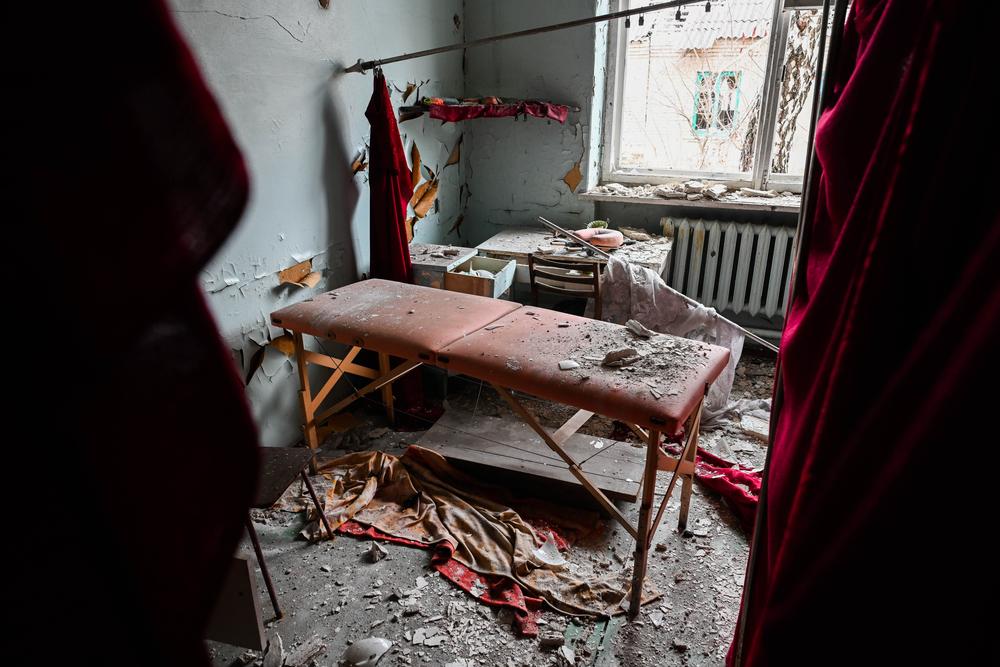International medical humanitarian organisation Médecins Sans Frontières/Doctors Without Borders (MSF) reveals the massive and widespread destruction of health facilities in Ukraine, and the severe impediments to medical care under Russian military occupation.
MSF urges all warring parties to uphold international humanitarian law and their obligations to protect civilians and civilian infrastructure and to ensure unhindered access to life-saving medicines and medical supplies for people in need.
Following the escalation of war in February 2022, MSF teams assessed the medical and humanitarian needs of people in 161 towns and villages in the Donetsk and Kherson regions to provide medical assistance to those living near the frontlines. Despite requests to work on both sides of the frontline, MSF is only able to operate in areas under Ukrainian control and our observations are limited to those areas.
“Our teams directly witnessed homes, stores, playgrounds, schools, and hospitals reduced to rubble. In some of the towns and villages where we work, the destruction was absolute. Along the 1,000 km of frontline in Ukraine, some areas have simply been wiped off the map", says Christopher Stokes, Head of Programmes for MSF in Ukraine.
Read our full report - Between Enemy Lines
Hospitals are not a safe place
By mid-2022, MSF medical workers had already witnessed attacks on healthcare infrastructure. In two separate instances, in Mikolaiv in April and in Apostolove in June, they witnessed the apparent effects of cluster munitions on hospitals, leaving medical activities suspended for several days and effectively depriving patients of access to medical care. In three other cases on the 8, 11 and 15 October 2022, MSF teams also discovered the presence of anti-personnel landmines inside functioning hospitals, in areas previously under Russian occupation in the regions of Kherson, Donetsk and in Izyum.
“The use of landmines is widespread in frontline areas, but to see them placed in medical facilities is shocking: a remarkable act of inhumanity. It sends a clear message to those who come in search of medicines or treatments: hospitals are not a safe place”, says Vincenzo Porpiglia, Project Coordinator for MSF activities in Donetsk region.
MSF medical teams have also discovered that several medical facilities located in former Russian occupied areas in both Kherson and Donetsk region had been looted, while medical vehicles including ambulances had been destroyed. Inside two of these facilities they saw weapons and explosives.
Healthcare under occupation
Accounts from health care workers and patients who lived under Russian occupation indicated severe restriction of access to essential medicines, treatment or medical facilities. These accounts were corroborated by MSF’s medical records following 11,000 consultations (November 2022-February 2023). MSF medical teams frequently had to treat patients for chronic conditions that went untreated for several months.
According to our patients, people were not able to access healthcare mainly due to movement restrictions, because of the massive destruction of health facilities or as a result of the unpredictable behaviour of some Russian units. Patients also reported that surviving medical facilities and pharmacies were looted and that the supply of medicines was not systematically assured by occupying forces. The interviews conducted are consistent with the medical diagnosis of many MSF patients that went untreated for months.
MSF reminds warring parties of their obligations to protect civilians and civilian infrastructure. Hospitals and other health care facilities must never be targets. Warring parties must also allow the unobstructed supply of life-saving medicines, medical supplies and provide safe and unhindered access to independent humanitarian assistance for those in need.
